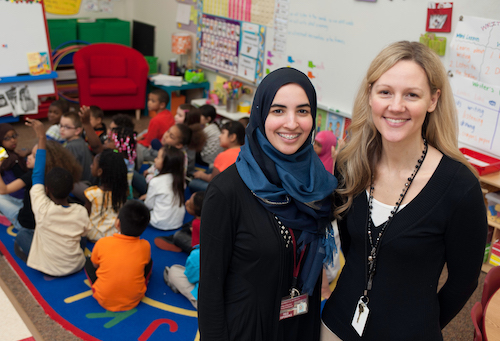Teacher education
The best teachers are backed by research
We want you to succeed from your first day in the classroom. That’s why our teacher education programs prepare you to be an expert in your field and an effective teacher. As a teacher licensure student at the University, you’ll be a part of:
- A world-renowned research university. You’ll learn from a community of faculty and graduate students who are respected experts in education. They are engaged in research that’s impacting the children, schools, and communities you’ll be working in.
- A program that is well respected in Minnesota school districts. Our students are highly sought after by Minnesota School principals and superintendents because of our reputation for effective preparation.
- A cohort of other teacher licensure students, so you can learn from your peers and build a lasting network of teacher colleagues.
Teacher preparation for reading instruction
The University of Minnesota, Twin Cities is committed to preparing teachers who understand and can apply research-backed teaching methodologies that will help all students become proficient readers. Learn more about teacher preparation for reading instruction.

2024 handbook website now available.
Our handbook for teacher candidates, cooperating teachers, and University supervisors has been revised for the 2023-2024 academic year.
Why are many of our teacher preparation programs offered at the graduate level?
Graduate level teacher education affords you the opportunity to first master your content knowledge through your undergraduate degree. Then, we place you into real classrooms in ways that work best for you and our school partners, creating an optimal experience. Our teacher education students collaborate with co-teachers to design and deliver lessons, work one-on-one with struggling learners, and assess student learning.
This supports not only teacher preparation, but also classroom experiences for the preK-12 learners. Our model:
- increases instructional options for teachers
- reduces student/teacher ratios
- addresses the size and diversity of today’s classrooms
- increases student engagement and participation
The Multiple Pathways to Teaching Office develops programs with local partners to address acute needs and specific goals. These programs include K-6 Elementary MEd and Initial Licensure with a focus on Dual Language Immersion (DLI-L) and the Minnesota Grow Your Own Teachers Program (MNGOT) which offers a combined master's degree with licensure options including K-6 Elementary, K-12 ESL, Secondary Science, and Secondary Math.
Our program areas
- Administrative Licensure
- Arts in Education (Dance, Theatre Arts, Visual Arts)
- Early Childhood (Undergraduate degree)
- Early Childhood Education (Master's degree and license)
- Elementary Education Foundations (Undergraduate degree)
- Elementary Education (Master's degree and license)
- Elementary Education: dual language/immersion
- English Education
- Literacy Education
- Mathematics Education
- Multilingual Education
- Parent and Family Education
- Science Education
- Social Studies Education
- Special Education (Undergraduate and master's degrees and licenses)
Two programs are housed in other colleges - Agricultural Education in CFANS and Music Education in CLA.
Licensure
We support current teacher licensure students throughout their time at the University. Major aspects of our work include: new student orientation, completing the Minnesota state teacher licensing process, and post-graduation job search.
Partnerships
We deepen University-school partnerships to improve preK-12 student learning. Major initiatives include: enhancing clinical placements, co-teaching in student teaching, improving mentoring of teacher candidates, preparing liaisons as teacher leaders, supporting partner school change, coordinating innovative projects, and sustaining a strong partner network.
Workshops and trainings
These workshops are an important part of a successful co-teaching experience for teacher candidates (TCs) and their cooperating teachers (CTs). It is during these workshops that TCs and new CTs learn about co-teaching and how it differs from a traditional student-teaching model.

Our work with the U of M is a catalyst for deep learning on both sides - our educators reflect on and strengthen their practice as they mentor and support the development of pre-service colleagues. Students ultimately benefit from the collaboration of two professionals working with them all year. We are grateful for the opportunity to partner in the important work of training the next generation of educators.
Karen Duke
Principal, St. Anthony Park Elementary School, St. Paul Public Schools